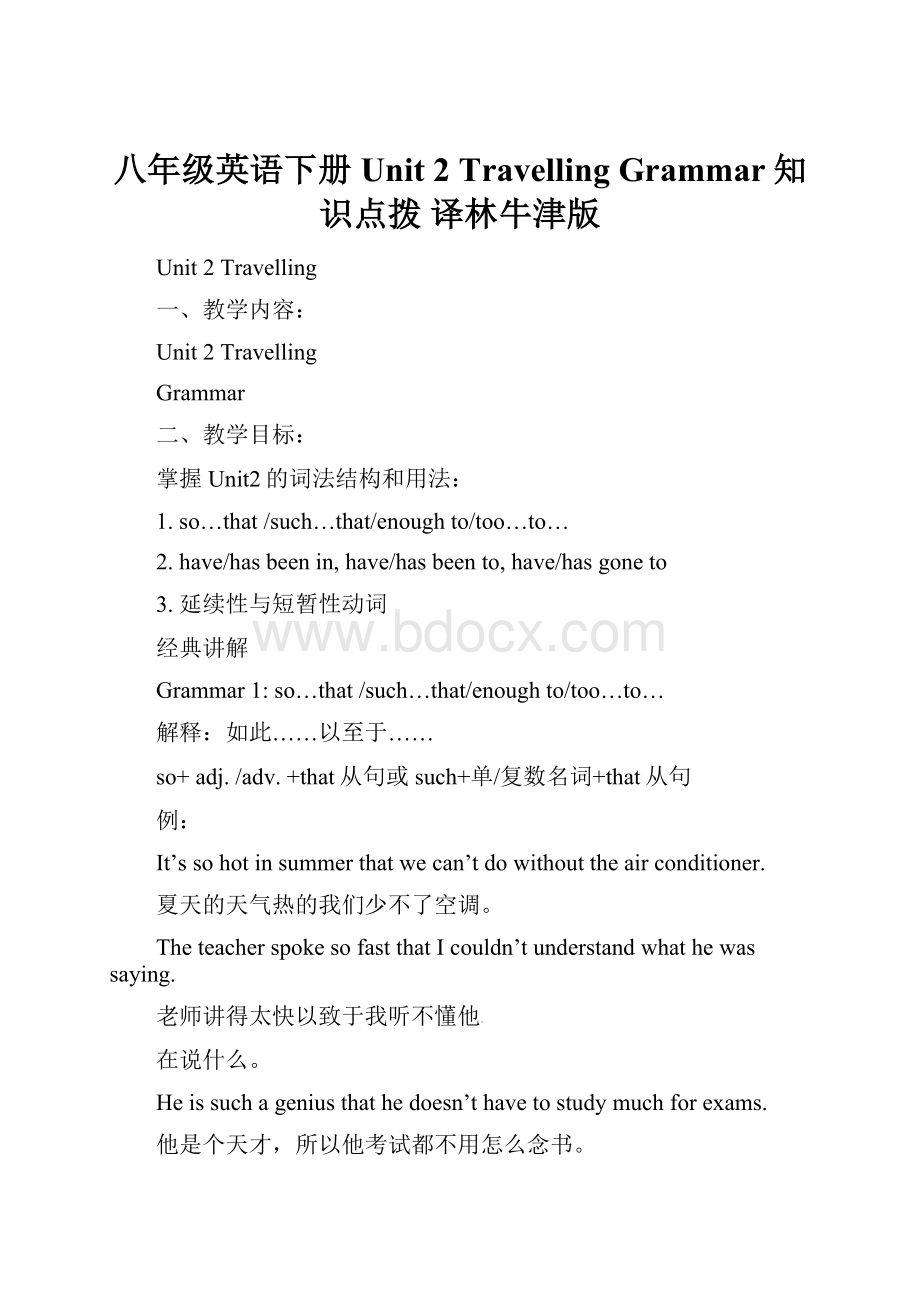八年级英语下册 Unit 2 Travelling Grammar知识点拨 译林牛津版.docx
《八年级英语下册 Unit 2 Travelling Grammar知识点拨 译林牛津版.docx》由会员分享,可在线阅读,更多相关《八年级英语下册 Unit 2 Travelling Grammar知识点拨 译林牛津版.docx(11页珍藏版)》请在冰豆网上搜索。

八年级英语下册Unit2TravellingGrammar知识点拨译林牛津版
Unit2Travelling
一、教学内容:
Unit2Travelling
Grammar
二、教学目标:
掌握Unit2的词法结构和用法:
1.so…that/such…that/enoughto/too…to…
2.have/hasbeenin,have/hasbeento,have/hasgoneto
3.延续性与短暂性动词
经典讲解
Grammar1:
so…that/such…that/enoughto/too…to…
解释:
如此……以至于……
so+adj./adv.+that从句或such+单/复数名词+that从句
例:
It’ssohotinsummerthatwecan’tdowithouttheairconditioner.
夏天的天气热的我们少不了空调。
TheteacherspokesofastthatIcouldn’tunderstandwhathewassaying.
老师讲得太快以致于我听不懂他
在说什么。
Heissuchageniusthathedoesn’thavetostudymuchforexams.
他是个天才,所以他考试都不用怎么念书。
Theyaresuchgoodbasketballplayersthateverybodywantstowatchtheirgames.
他们个个都是很棒的篮球员,所以每个人都想去看他们打球。
表示:
足以做某事enoughto…如:
Heisoldenoughtodoit.
意思是太……而不能too...to…例:
Heistooyoungtogotoschool.
中考链接
so…that,too…to和enoughto都是初中英语教材中的重要结构,在一定条件下它们可以相互转换,并经常成为中考考查的热点之一。
先请看下面两道中考试题:
1.Heisoldenoughtogotoschool.
Heis____________________that____________________gotoschool.
2.Shewassoweakthatshecouldn’ttakecareofherbaby.
Shewas__________weak__________takecareofherbaby.
(答案:
1.soold;hecan2.too;to)
那么在什么情况下三者可以相互转换呢?
(一)so…that与too…to的转换
当that引导的从句为否定式且从句主语与主句的主语相同时,so…that可转换为too…to结构;若从句主语与主句的主语不相同时,so…that可转换为too…forsb.to结构。
例如:
Theboxissoheavythathecan’tcarryit.=Theboxistooheavyforhimtocarry.
(二)so…that与enoughto的转换
1.当that引导的从句为肯定式时,若从句主语与主句主语相同时,so…that可转换为enoughto结构;若从句主语与主句主语不相同时,so…that可转换为enoughforsb.to结构。
例如:
XiaoLinissooldthath
ecangotoschool.=XiaoLinisoldenoughtogotoschool.
Theboxissolightthathecancarryit.=Theboxislightenoughforhimtocarry.
2.当that引导的从句为否定式时,若从句主语与主句主语相同时,so…that可转换为enoughto的否定结构;若从句主语与主句主语不相同时,so…that可转换为enoughforsb.to的否定结构。
同时要注意,转换后的形容词(副词)要用其相应的反义词。
例如:
Themanissooldthathecan’tgotowork.=Themanisn’tyoungenoughtogotowork.
ThedeskissoheavythatIcan’tmoveit.=Thedeskisn’tlightenoughformetomove.
(三)enoughto的句式为否定式时,enoughto可以转换为too…to结构。
转换后的too…to结构中的形容词(副词)要用其相应的反义词。
例如:
Heisnotoldenoughtodothework.=Heistooyoungtodothework.
Theproblemis
toodifficultformetoworkout.=Theproblemisn’teasyenoughformetoworkout.
【典型例题】
一、改写同义句。
1.Thebookisinterestingenoughforeverybodytoread.
Thebookis____interesting____everybodylikestoreadit.
2.Theboyissoshortthathecan’treachthebuttonsofthelift.
Theboyis____short________thebuttonsofthelift.
Theboyisn’t_________________thebuttonsofthelift.
3.Heissuchayoungboythathecan’tgotoschool.
Heis_____young______hecan’tgotoschool.
Heis_____old_____togotoschool.
Heis_____young_____gotoschool.
4.Heissooldthathecangooutalone.
Heis___________________gooutalone.
5.Mr.Wuissopatientthathespendsmuchtimeexplainingthingstous.
Mr.Wuis_____________________spendmuchtimeexplainingthingstous.
6.Thepandaissofatthatitcan’tgothroughthehole.
Thepandais________________gothroughthehole.
【答案】
1.so;that
2.too;toreach;tallenoughtoreach
3.so;that/not;enough/too;to
4.oldenoughto
5.patientenoughto
6.toofatto
二、翻译句子。
1.这本书太难,我读不懂。
2.他太累,不能再走了。
3.他跑得太快了,没有人能赶上他。
4.雨下得很大,我们出不去。
5.那天很忙,我们没有去买东西。
6.他太小了,不能去上学。
7.我说得太快了,他们不能明白我的话。
8.这个女孩到上学的年龄了。
9.这道题很简单,我们能够回答它。
10.这个房间太小,不能容纳200人。
11.这个箱子太重,我们搬不动。
【答案】
1.ThisbookissodifficultthatIcan’treadit.
2.Hefeltsotiredthathecouldn’twalkanylonger.
3.Heransofastthatnoonecouldcatchupwithhim.
4.Itrainedsoheavilythatwecouldn’tgoout.
5.Itwassobusyadaythatwedidn’tgoshopping.
6.Hewassoyoungthathecouldn’tgotoschool.=Hewastooyoungtogotoschool.
7.Ispokesoquicklythattheycouldn’tunderstandme.=Ispoketooquicklyfor
themtounderstand.
8.Thegirlissooldthatshecangotoschool.=Thegirlisoldenoughtogotoschool.
9.Thequestionissoeasythatwecananswerit.=Thequestioniseasyenoughforustoanswer.
10.Theroomissosmallthatitcan’thold200peo
ple.=Theroomistoosmalltohold200people.=Theroomisn’tbigenoughtohold200people.
11.Theboxissoheavythatwecan’tcarryit.=Theboxistooheavyforustocarry.=Theboxisn’tlightenoughforustocarry.
Grammar2:
havebeento,havegoneto和havebeenin的区别
havebeenin,havebeento,havegoneto
这三个短语都有“到某地去”的意思,但含义和用法各不相同。
havebeenin强调“过去曾去过”之意,表示经验;
havebeento的意思是“过去到过而现在已返回”,它强调“最近的经历”;
havegoneto表示“动作的完成”,强调人已离开说话的地方。
通过下列句子的对比,可以分清它们各自不同的含义:
(1)TheyhavebeeninChicago.
(2)TheyhavebeentoChicago.
(3)TheyhavegonetoChicago.
(1)句的意思是“他们曾去过芝加哥”,此语强调过去的经历,但没有说明现在是否已回来。
言外之意,他们到过芝加哥,他们知道芝加哥在何处,该城市有多大,人口有多少等等。
(2)句的意思是“他们曾到过芝加哥,现在已回来了”。
此语强调的是往返的经历。
(3)句的意思是“他们已到芝加哥去了”,此语的言外之意是“也许他们已经到达,也许现在还在途中”,它强调“去”的动作已经完成,所以人已不在说话的地点。
1.havebeenin用例:
Howlonghaveyoubeeninclasstoday?
今天你在班里呆了多长时间?
TheyhavebeeninBeijingfortwoweeks.他们在北京已经有两个星期了。
Howlonghaveyoubeeninthiscity?
你在这个城市呆了多久?
2.havebeento用例:
HehasbeentoParisthreetimes.他去过巴黎三次。
Theyhavebeentothezoo.他们到动物园去了。
The
childrenhavegonetoplayinthepark.孩子们到公园玩耍去。
3.havegoneto用例:
HehasgonetoParis.他去巴黎了。
Everyonehasgonehome.大家都回家去了。
Hehasgonetoseeheruncle.他去看他叔叔了。
Shehasgonetothecinemawithherboyfriend.她与男朋友看电影去了。
注意:
遇到四个地点副词时要去掉to,这四个地点副词是:
here,there,home,abroad
【典型例题】
一、用have/hasbeento;have/hasbeenin;have/hasgoneto填空
1)Where’sJim?
—hehas_____Guiling.
2)Shehas_____thepark,shewillbebackintwohours.
3)Ihave_____theWestlake,Look,Ihavetakenmanyphotosonit.
4)Tomhas_____toJim’shome,buthehasn’tcomeback.
5)Theyhave_____Beijingforthreemonths.
6)TheWhiteshave_____theU.S.A,Theywon’tcomeback.
7)Wehave____thebookshopandboughtmanybooks.
8)Shehas_____h
erhomeland;sheiscomingtomyhomenextweek.
9)Ihave______HongKongtwice.
10)Wehave_____theMountTai,weallenjoyedourselves.
11)Ihavenever______thebeachinSonya.
12)Hemissedhismotherverymuch,sohehasalready_____hishome.
13)Theyhave_____Hangzhou,theyfounditveryinteresting.
14)Tomhas______totheW.C,soIhavetowaitforhim.
15)Howmanytimeshaveyou_____toShanghai.
16)Hehasever_____herewithhiswife.
17)IliketheMountRedPark.Ihave_____thereforfivedays.
18)MayIspeaktoLily?
—-Sorry,shehas______Xi’an
19)Hehasnever______toHangzhou,buthehas______Wuhanonce.
20)Ihaven’tseenhimrecently.—Oh,hehas______Fujian.
【答案】
1.goneto2.goneto3.beento4.gone5.beenin
6.goneto7.beento8.goneto9.beento10.beento
11.beento12.beento13.b
eento14.gone15.b
een
16.been17.been18.goneto19.beento;beento20.goneto
二、翻译句子。
1.你曾经去过上海吗?
2.他到美国去过两次。
3.亨利到伦敦去了。
4.我的父亲去了武汉,这个星期回来。
5.他去过巴黎三次。
6.他们到动物园去了。
7.孩子们到公园玩
耍去。
8.他去巴黎了。
9.他去看他叔叔了。
10.她与男朋友看电影去了。
【答案】
1.HaveyoueverbeentoShanghai?
2.HehasbeentoAmericatwice.
3.HenryhasgonetoLondon.
4.MyfatherhasgonetoWuhan,andhe’llbebackthisweek.
HehasbeentoParisthreetimes.
5.Theyhavebeentothezoo.
6.Thechildrenhavegonetoplayinthepark.
7.HehasgonetoParis.
8.Hehasgonetoseeheruncle.
9.Shehasgonetothecinemawithherboyfriend.
Gram
mar3:
延续性动词与终止性动词
(一)延续性动词和终止性动词的概念
英语中,动词按其动作发生的方式、动作发生过程的长短,可分为延续性动词和终止性动词。
延续性动词表示能够延续的动作,这种动作可以延续下去或产生持久影响。
如:
learn,work,stand,lie,know,walk,keep,hav
e,wait,watch,sing,read,sleep,live,stay等。
终止性动词也称非延续性动词、瞬间动词或短暂性动词,表示不能延续的动作,这种动作发生后立即结束。
如:
open,close,finish,begin,come,go,arrive,reach,getto,leave,move,borrow,buy等。
(二)延续性动词的用法特征
1.延续性动词可以用于现在完成时,其完成时态可与表示“一段时间”的状语连用。
表示“一段时间”的短语有:
fortwoyears,duringthepastthreeyears,sincelastyear,howlong等。
如:
IhavelearnedEnglishsinceIcamehere.自从我来到这儿就学英语了。
2.延续性动词不能与表示短暂时间的“点时间”状语连用。
如:
Itraindateightyesterdaymorning.(误)rain为延续性动词,而ateight表示“点时间”,前后显然矛盾。
如果用延续性动词表示一瞬间的动作,可以借助come,begin,get等终止性动词来表示。
上句可改为:
Itbegantorainateightyesterdaymorning.(正)又如:
—WhendidyougettoknowJack?
—Twoyearsago.
—Thenyou’veknowneachotherformorethantwoyears.
—That’sright.
(三)终止性动词的用法特征
1.终止性动词可用来表示某一动作完成,因此可用于现在完成时。
如:
Thetrainhasarrived.火车到了。
Haveyoujoinedthecomputergroup?
你加
入电脑小组了吗?
2.终止性动词表示的动作极其短暂,不能持续。
因此,不可与表示一段时间的状语连用(只限肯定式)。
如:
(1)他死了三年了。
误:
Hehasdiedforthreeyears.
正:
Hehasbeendeadforthreeyears.
正:
Hediedthreeyearsago.
正:
Itisthreeyearssincehedied.
正:
Threeyearshaspassedsincehedied.
(2)他来这儿五天了。
误:
Hehascomehereforfivedays.
正:
Hehasbeenhereforfivedays.
正:
Hecameherefivedaysago.
正:
Itisfivedayssincehecamehere.
正:
Fivedayshaspassedsincehecamehere.
(1)、
(2)句中的die、come为终止性动词,不能与表示“一段时间”的状语连用。
那么,应如何正确表达呢?
可以采用下面的四种方法:
(1)将句中终止性动词转换为相应的延续性动词,如上面两例中的第一种正确表达方式。
下面列举几例:
leave→beaway,borrow→keep,buy→have,begin/start→beon,die→bedead,moveto→livein,finish→beover,join→bein/beamemberof,opensth.→keepsth.open,fallill→beill,getup→beup,catchacold→haveacold
(2)将句中表示“一段时间”的状语改为表示过去确定时间的状语,如上面两例中的第二种正确表达方式。
(3)用句型“Itis+一段时间+since...”表达原意,如上面两例中的第三种正确表达方式。
(4)用句型“时间+haspassed+since...”表达原意,如上面两例中的第四种正确表达方式。
3.终止性动词可用于现在完成时否定式中,成为可以延续的状态,因而可与表示一段时间的状语连用。
如:
Hehasn’tleftheresince1986.
Ihaven’theardfrommyfatherfortwoweeks.